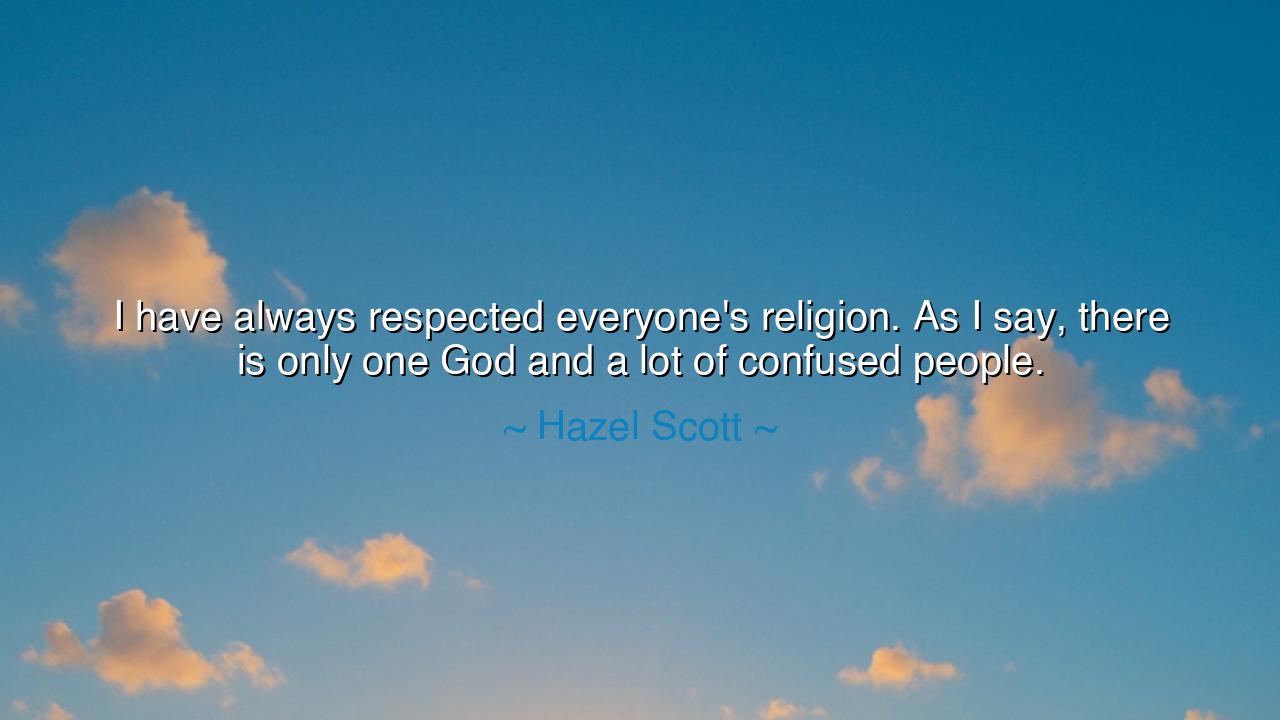
I have always respected everyone's religion. As I say, there is
I have always respected everyone's religion. As I say, there is only one God and a lot of confused people.






Hear, O children of wisdom, the clear and unwavering words of Hazel Scott: “I have always respected everyone’s religion. As I say, there is only one God and a lot of confused people.” In this statement resounds the voice of humility and clarity, a reminder that while human beings divide themselves into tribes, sects, and denominations, the Divine itself is not fragmented. There is but one God, one eternal source of life and truth, and the divisions we cling to are born not from heaven but from human frailty and confusion.
The origin of these words lies in Hazel Scott’s life as an artist and activist, a woman who crossed boundaries of culture and nation, refusing to be confined by narrow definitions. She understood the common humanity that unites us and saw religion not as a battlefield of competing claims, but as many rivers flowing from the same spring. By saying she respects all religions, she calls us back to the essence of spirituality: reverence for the divine and compassion for one another. By noting that people are “confused,” she gently points out that it is often our egos, our pride, and our institutions that obscure the simplicity of the truth.
The ancients knew this as well. In the Rig Veda of India it is written: “Truth is one; the wise call it by many names.” Likewise, in the teachings of the Stoics, God was seen as reason and order that pervades all things, beyond the walls of temples or the divisions of priesthoods. Even the prophet Micah in Israel declared that God does not desire endless rituals, but justice, mercy, and humility. Scott’s words stand in this long tradition, reminding us that the confusion of men must not blind us to the unity of the Divine.
History gives us countless examples of this tension. Consider the wars of religion in Europe, where Protestants and Catholics slaughtered each other for over a century. Both proclaimed loyalty to Christ, yet their hands were stained with the blood of brothers. Were there two gods at war? No—the war was born of human confusion, of pride and politics. Or consider the clash of empires in the Crusades, where armies marched under the banner of God, only to massacre and enslave. Again, the divine was not divided—only men were.
The meaning of Hazel Scott’s words is both a rebuke and an invitation. She rebukes arrogance, the pride that claims one people alone have the fullness of truth, while others are despised as enemies of God. She invites us instead to respect, to honor the sincerity of all seekers, even if their paths differ. By recognizing that confusion belongs to humanity, not to God, she frees us from the need to condemn and opens the door to compassion.
The lesson for us, O listeners, is vital: seek unity, not division. Do not despise another because their prayers are sung in a different tongue or their rituals are shaped by another tradition. Remember that the true measure of faith is not the label of your religion, but the love in your actions. A kind Muslim, Jew, Christian, Hindu, or atheist is closer to God’s heart than a cruel believer who clings to dogma without compassion. The Divine sees not our confusion but our sincerity.
Practical steps stand before you: When you encounter a faith not your own, listen with respect rather than judgment. When differences provoke anger, recall that beneath the surface lies a shared longing for the eternal. Practice humility in your own belief, acknowledging that all human understanding is partial. And above all, live with compassion, for love is the one language that transcends confusion and speaks directly to God.
Thus, remember the teaching of Hazel Scott: “There is only one God and a lot of confused people.” Let this truth strip away pride, soften division, and awaken reverence in your heart. For the Divine is one, eternal and unbroken, and we, though scattered and stumbling, are all children of that same mystery. Respect each path, but seek the essence beyond them all—the unity that turns confusion into clarity, and discord into peace.






AAdministratorAdministrator
Welcome, honored guests. Please leave a comment, we will respond soon